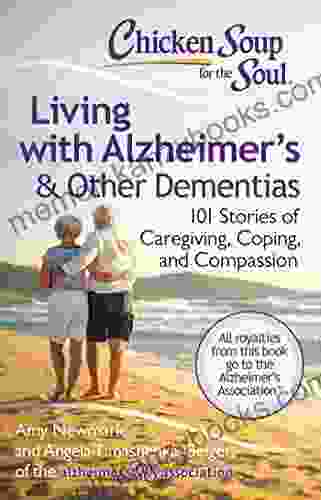Living with Alzheimer's & Other Dementias: A Comprehensive Guide for Caregivers

Alzheimer's disease and other dementias are progressive neurological conditions that affect millions of people worldwide. Caregiving for someone with dementia can be a challenging and emotionally demanding experience, but it is also an opportunity for growth and profound connection.
4.7 out of 5
| Language | : | English |
| File size | : | 5835 KB |
| Text-to-Speech | : | Enabled |
| Screen Reader | : | Supported |
| Enhanced typesetting | : | Enabled |
| Word Wise | : | Enabled |
| Print length | : | 369 pages |
This comprehensive guide provides essential information and support for individuals who are caring for someone with Alzheimer's or another type of dementia. We will cover topics such as:
- Understanding the nature of Alzheimer's and other dementias
- Diagnosing and managing the disease
- Effective care strategies for different stages of dementia
- Supporting the emotional well-being of both the caregiver and the person with dementia
- Accessing support and resources
Whether you are just starting your caregiving journey or have been providing care for some time, this guide aims to provide you with the knowledge, skills, and support you need to navigate this challenging yet meaningful experience.
Understanding Alzheimer's & Other Dementias
Alzheimer's disease is the most common form of dementia, accounting for roughly 60-80% of cases. It is a progressive neurodegenerative disFree Download that affects memory, thinking, and behavior. Other common types of dementia include vascular dementia, frontotemporal dementia, Lewy body dementia, and mixed dementia.
The symptoms of dementia can vary depending on the type and stage of the disease, but they often include:
- Memory loss
- Difficulty with language and communication
- Problems with reasoning and judgment
- Changes in mood and behavior
- Loss of motor skills
Dementia is a complex and challenging condition, but it is important to remember that it is not a death sentence. With the right care and support, people with dementia can live full and meaningful lives.
Diagnosis & Management
Diagnosing Alzheimer's or another type of dementia can be a complex process that involves a thorough medical evaluation, including a physical exam, cognitive tests, and brain scans. Early diagnosis is crucial for accessing appropriate treatment and support services.
While there is currently no cure for Alzheimer's or other dementias, there are treatments available to manage the symptoms and slow the progression of the disease. These treatments may include:
- Medications
- Lifestyle changes
- Cognitive stimulation
- Behavioral therapy
- Caregiving support
Managing dementia can be a challenging task, but with the right support system in place, it is possible to provide the best possible care for your loved one.
Effective Care Strategies
Caring for someone with dementia requires a multifaceted approach that addresses the individual's physical, emotional, and cognitive needs. Here are some effective care strategies for different stages of dementia:
Early Stage
In the early stages of dementia, individuals may be able to maintain a relatively independent生活style. They may experience mild memory loss and difficulty with complex tasks, but they can usually still participate in activities they enjoy.
Care strategies for the early stage of dementia include:
- Providing cognitive stimulation through puzzles, games, and conversation
- Encouraging physical activity and a healthy diet
- Simplifying tasks and providing cues to help with memory
- Supporting the person's sense of independence and dignity
Middle Stage
As dementia progresses, individuals may experience more significant cognitive and behavioral changes. They may need more assistance with daily tasks, such as bathing, dressing, and eating.
Care strategies for the middle stage of dementia include:
- Creating a safe and supportive environment
- Providing regular and consistent routines
- Using gentle communication and reframing techniques
- Managing behavioral challenges with patience and understanding
Late Stage
In the late stage of dementia, individuals may lose the ability to communicate, walk, and even swallow. They may become increasingly dependent on others for care.
Care strategies for the late stage of dementia include:
- Providing comfort and support
- Ensuring proper nutrition and hydration
- Preventing infections and pressure sores
- Supporting the person's духовное and emotional well-being
Caring for someone with dementia is a journey that is both challenging and rewarding. By understanding the nature of the disease, implementing effective care strategies, and accessing support and resources, caregivers can help their loved ones live full and meaningful lives.
Supporting Emotional Well-Being
Caring for someone with dementia can have a significant impact on the caregiver's emotional well-being. It is crucial to prioritize your own self-care and seek support when needed.
Here are some tips for supporting your emotional well-being as a caregiver:
- Join a support group. Connecting with other caregivers can provide invaluable support and a sense of community.
- Seek professional help. A therapist can help you cope with the challenges of caregiving and develop strategies for managing your emotions.
- Take breaks. Respite care services can provide temporary relief and allow you to recharge.
- Practice self-care. Make time for activities that bring you joy and relaxation, such as exercise, meditation, or spending time with loved ones.
- Remember that you are not alone. Millions of people around the world are caring for loved ones with dementia. There is always someone who can offer help and support.
Caring for someone with dementia is a demanding task, but it is also a powerful opportunity for personal growth and connection. By prioritizing your own well-being and accessing support, you can provide the best possible care for your loved one while also maintaining your own health and happiness.
Accessing Support & Resources
Caring for someone with dementia is a complex task that can be overwhelming at times. Fortunately, there are numerous resources and support services available to assist caregivers.
Here are some valuable resources:
- Alzheimer's Association: The Alzheimer's Association provides a wealth of information, support, and resources for caregivers. Visit their website at https://www.alz.org/.
- National Institute on Aging: The National Institute on Aging (NIA) is a federal agency that conducts and supports research on aging and age-related diseases. Their website at https://www.nia.nih.gov/ offers valuable information and resources for caregivers.
- Local support groups: Many communities have support groups for caregivers of individuals with dementia. These groups provide a forum for sharing experiences, getting support, and learning about resources.
- Respite care services: Respite care services provide temporary relief for caregivers by caring for their loved ones for a few hours or days. This can be a valuable service for caregivers who need to take a break or attend to other obligations.
- Home care agencies: Home care agencies can provide a range of services for individuals with dementia, such as personal care, meal preparation, and companionship. This can help to
4.7 out of 5
| Language | : | English |
| File size | : | 5835 KB |
| Text-to-Speech | : | Enabled |
| Screen Reader | : | Supported |
| Enhanced typesetting | : | Enabled |
| Word Wise | : | Enabled |
| Print length | : | 369 pages |
Do you want to contribute by writing guest posts on this blog?
Please contact us and send us a resume of previous articles that you have written.
 Book
Book Novel
Novel Page
Page Chapter
Chapter Text
Text Story
Story Genre
Genre Reader
Reader Library
Library Paperback
Paperback E-book
E-book Magazine
Magazine Newspaper
Newspaper Paragraph
Paragraph Sentence
Sentence Bookmark
Bookmark Shelf
Shelf Glossary
Glossary Bibliography
Bibliography Foreword
Foreword Preface
Preface Synopsis
Synopsis Annotation
Annotation Footnote
Footnote Manuscript
Manuscript Scroll
Scroll Codex
Codex Tome
Tome Bestseller
Bestseller Classics
Classics Library card
Library card Narrative
Narrative Biography
Biography Autobiography
Autobiography Memoir
Memoir Reference
Reference Encyclopedia
Encyclopedia Steve Seguis
Steve Seguis Amrita Sondhi
Amrita Sondhi Kiyotaka Toshimori
Kiyotaka Toshimori Lorie Dechar
Lorie Dechar Amby Cooper
Amby Cooper Amy Noelle Roe
Amy Noelle Roe Andrea Pyros
Andrea Pyros Nostradamus
Nostradamus Dr Brandt R Gibson
Dr Brandt R Gibson Susan Burrowes
Susan Burrowes America Hebe
America Hebe Julia Shannahan
Julia Shannahan Susannah Shmurak
Susannah Shmurak Michael Mejia
Michael Mejia Robyn Brook
Robyn Brook Ana Sortun
Ana Sortun Andrea Nakayama
Andrea Nakayama Amina Ali
Amina Ali Jfk Mensah
Jfk Mensah Amy Burns
Amy Burns
Light bulbAdvertise smarter! Our strategic ad space ensures maximum exposure. Reserve your spot today!

 Nathaniel Powell500 Affordable Quick Easy Air Fryer Recipes: Fry, Bake, Grill, and Experience...
Nathaniel Powell500 Affordable Quick Easy Air Fryer Recipes: Fry, Bake, Grill, and Experience...
 Bret MitchellHow To Swim Easily And Enjoyably: DIY Swimming Course - Do It Yourself Learn...
Bret MitchellHow To Swim Easily And Enjoyably: DIY Swimming Course - Do It Yourself Learn... Vladimir NabokovFollow ·5.5k
Vladimir NabokovFollow ·5.5k Billy PetersonFollow ·9.7k
Billy PetersonFollow ·9.7k Martin CoxFollow ·11.1k
Martin CoxFollow ·11.1k William GoldingFollow ·2.6k
William GoldingFollow ·2.6k Cole PowellFollow ·13.6k
Cole PowellFollow ·13.6k Jack PowellFollow ·12.3k
Jack PowellFollow ·12.3k Fredrick CoxFollow ·12.5k
Fredrick CoxFollow ·12.5k Clark BellFollow ·2.1k
Clark BellFollow ·2.1k

 Miguel Nelson
Miguel NelsonFour Cookbooks In One: Recipes To Fight Cancer, Heart...
Looking for a healthy way...

 Marcus Bell
Marcus BellHearts and Souls: Exploring the Lives and Legacies of...
The Special Olympics movement has been a...

 Tony Carter
Tony CarterDiagnosed With Breast Cancer: Navigating Life After the...
A breast cancer diagnosis can be a...

 Joe Simmons
Joe SimmonsLiddypool: The Stories and Interviews – A Literary...
In the realm of...

 Jett Powell
Jett PowellBreakfast for Boneheads: 66 Breakfast Recipes for Lazy...
Are you tired of eating the...
4.7 out of 5
| Language | : | English |
| File size | : | 5835 KB |
| Text-to-Speech | : | Enabled |
| Screen Reader | : | Supported |
| Enhanced typesetting | : | Enabled |
| Word Wise | : | Enabled |
| Print length | : | 369 pages |










